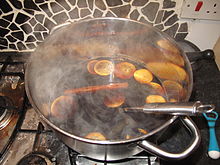Wassail Song

Der Wassail Song oder nach seinem Anfangsvers: Here We Come A-wassailing (oder Here We Come A-caroling) ist ein englisches traditionelles Weihnachts- und insbesondere Neujahrslied,[1] das um 1850 gedruckt wurde.[2] Text und Musik stammen wahrscheinlich aus dem 17. Jahrhundert.[3]
Das Lied besingt und ist Teil des alten Brauches des Wassailing (von mittelenglisch wæs hæil) bzw. Carolsingens von Haus zu Haus mit dem Wünschen einer guten Gesundheit.[4] Das a- in „A-wassailing“ ist ein archaisches intensivierendes Präfix (vgl. A-Hunting We Will Go und im Text von The Twelve Days of Christmas ab der Stelle „Six geese a-laying“ usw.).
Refrain[Bearbeiten | Quelltext bearbeiten]
Sein Kehrvers (Refrain) lautet:
|
|
Es gipfelt in der Schlussstrophe:
|
|
Es gibt unterschiedliche Versionen des Textes. Die Strophen der einzelnen Strophen werden im 6/8-Takt gesungen, während der Chor im Kehrvers auf 2/2 wechselt. Die Verse 2, 4 und 6 werden ausgelassen, wenn das Carol in der Kirche gesungen wird.[5]
Text[Bearbeiten | Quelltext bearbeiten]
Oxford Book of Carols (1928:31), dort nach Husk: Songs of Nativity (1868)
1. Here we come a-wassailing
Among the leaves so green
Here we come a-wandering
So fair to be seen.
REFRAIN:
Love and joy come to you,
And to you your wassail too,
And God bless you and send you
A happy new year.
2. Our wassail cup is made
Of the rosemary tree,
And so is your beer
Of the best barley.
REFRAIN
3. We are not daily beggars
That beg from door to door,
But we are neighbours' children
Whom you have seen before.
REFRAIN
4. Call up the butler of this house,
Put on his golden ring;
Let him bring us up a glass of beer,
And better we shall sing.
REFRAIN
5. We have got a little purse
Of stretching leather skin.
We want a little of your money
To line it well within.
REFRAIN
6. Bring us out a table,
And spread it with a cloth;
Bring us out a mouldy cheese,
And some of your Christmas loaf.
REFRAIN
7. God bless the master of this house,
Likewise the mistress too;
And all the little children
That round the table go.
REFRAIN
8. Good Master and good Mistress,
While you're sitting by the fire,
Pray think of us poor children
Who are wandering in the mire.
REFRAIN
Literatur[Bearbeiten | Quelltext bearbeiten]
- William Henry Husk: Songs of the Nativity (London: John Camden Hotten, 1868) (Digitalisat)
- William James Vinson: Vinson's Christmas and Other Oddities. 2012 (Online-Auszug)
Weblinks[Bearbeiten | Quelltext bearbeiten]
- hymnsandcarolsofchristmas.com (1), (2); (3) Yorkshire Wassail; (4) Wassailing! Notes On The Songs And Traditions
- piereligion.org: Wassailing
- Making a Wassail Bowl
Videos[Bearbeiten | Quelltext bearbeiten]
- The Wassail Song (The Starlight Carolers)
- The Yorkshire Wassail (Towneley Hall, Burnley)
- Moderne Parodie (Samuel Stokes)
Siehe auch[Bearbeiten | Quelltext bearbeiten]
Einzelnachweise[Bearbeiten | Quelltext bearbeiten]
- ↑ hymnsandcarolsofchristmas.com
- ↑ William Henry Husk: Songs of the Nativity (London: John Camden Hotten, 1868): "This carol is from a broadside printed at Bradford in Yorkshire within the last twenty years."
- ↑ “probably created 17th century” (William E. Studwell: Christmas Carols. A Reference Guide. New York & London 1985, S. 215 (Nr. 736))
- ↑ wassail, in: Merriam-Webster Online Dictionary
- ↑ Oxford Book of Carols (1928:31)